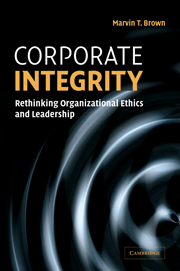Book contents
- Frontmatter
- Contents
- Preface
- 1 The context for corporate integrity
- 2 Cultural integrity as openness
- 3 Interpersonal integrity as relational wholeness
- 4 Organizational integrity as pursuing a worthwhile purpose
- 5 Social integrity as civic cooperation
- 6 Environmental integrity as natural prosperity
- 7 Corporate integrity and organizational leadership
- Appendix: Assessment worksheets
- Bibliography
- Index
7 - Corporate integrity and organizational leadership
Published online by Cambridge University Press: 05 September 2012
- Frontmatter
- Contents
- Preface
- 1 The context for corporate integrity
- 2 Cultural integrity as openness
- 3 Interpersonal integrity as relational wholeness
- 4 Organizational integrity as pursuing a worthwhile purpose
- 5 Social integrity as civic cooperation
- 6 Environmental integrity as natural prosperity
- 7 Corporate integrity and organizational leadership
- Appendix: Assessment worksheets
- Bibliography
- Index
Summary
In the course of the previous five chapters, the quest for understanding corporate integrity began with the challenges of culture and ended with the challenges of nature, the two basic foundations of human communities. In a sense both nature and culture are always given; we are born into them and live in their context. Today, however, we no longer experience them as simply there. Their quality largely depends on current interpersonal, organizational, and civic relationships and these relationships depend on the design of the conversational patterns in which they exist. When these communication patterns do not promote corporate integrity, organizational leaders need to change them. This process of leading by changing communication patterns is the theme of this final chapter.
Organizational leaders who intend to promote corporate integrity will discover the possibilities and limitations for doing so embedded in the quality of the conversational patterns that constitute a corporation's cultural, interpersonal, organizational, civic, and natural dimensions. Because these five dimensions of corporate integrity are interconnected, the possibilities for developing corporate integrity are actually greater than one might first imagine. Reviewing some of these connections can set the stage for exploring how leaders can improve corporate integrity.
The connections among the five dimensions of integrity
When the last chapter concluded with the suggestion that corporations must become aware of their boundaries and limits, it was actually reiterating a suggestion already presented in Chapter 2.
- Type
- Chapter
- Information
- Corporate IntegrityRethinking Organizational Ethics and Leadership, pp. 196 - 223Publisher: Cambridge University PressPrint publication year: 2005



